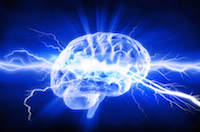 You have a wonderful, complex, amazing brain – who you are, your personality, your astonishing abilities, your memory, are all seated in your remarkable brain.
You have a wonderful, complex, amazing brain – who you are, your personality, your astonishing abilities, your memory, are all seated in your remarkable brain.
Until the last ten years or so, it was believed that brain cells could not be replaced and once your brain, and your memory with it, was affected by ageing there was simply nothing you could do about it.
Then came the startling discovery that indeed brain cells can regenerate – a process known as plasticity, or neurogenesis. Immediately, brain and memory became ‘hot’ topics of scientific research. Of prime importance to us is the discovery that we can influence our own destiny to a great extent as far as memory is concerned. Research has clearly shown that mental exercise as well as lifestyle factors, particularly exercise, can not only improve memory, but can restore abilities that seem to have been lost. Memory isn’t just one object that can be lost! It is made up of many different systems in the brain. There is no doubt – brain health = memory health.
The discovery that the brain can produce new neurons was confirmed only very recently. In 1998 scientists discovered the emergence of new neurons in rhesus monkeys, and in 2001 researchers confirmed that this also takes place in humans. There are two places in the hippocampal dentate gyrus (nestled underneath the hippocampus) where new neurons are generated. From here they migrate to other parts of the brain. I was excited to hear Professor Richard Faull from the University of Auckland on the radio, explaining that four brain research departments across New Zealand are combining to research this exciting discovery. I can't wait to find out more…
Did you know?
1,000,000,000,000,000
You have about one quadrillion synapses in the human brain
1,000,000,000,000
And about one trillion glial cells in the human brain
100,000,000,000
There are about 100 billion neurons in the human brain
250,000
Brains grow by 250,000 neurons per minute before birth
10,000
A single neuron has up to 10,000 synapses
250
Neural impulses can travel up to 250 miles per hour
Have you ever wondered about why this happens?
Have you experienced an ice cream headache? About 30% of people experience them while eating ice cream or other cold food in hot weather. Researchers think this occurs when the nerves on the roof of the mouth sense the coldness and send a message to the brain to increase the blood flow to the brain to keep the brain warm. It is the blood vessels dilating to allow the increased blood flow that causes the headache.
Ouch – I'm sure you have noticed the time delay between having a finger or your toes squashed or perhaps touching a hot iron, and feeling the pain. This happens because different types of nerves carry signals to the brain at different speeds. The first touch is carried along thick fibres at about 250 miles per hour. The pain signal is carried on thinner, slower nerves. Hence the slight delay between the injury and feeling the pain.
The brain is energy-hungry and requires more of the body's energy than any other organ. About a fifth of the body's blood supply is consumed by the brain. From this supply the brain generates about 25 watts of power – this is enough to light a light bulb!
It is extraordinary. Your body has more than 80,000 km of nerves! Each nerve is made up of bundles of neurons. The spinal cord alone has 13,500,000 neurons. In a human being, a single nerve can be up to 90 centimetres long. If all the neurons in the human body were placed end to end, they would stretch about 402,000 km. That's ten times around the earth. Aren't our bodies amazing?
Although neuroscience has not yet unravelled the deepest secrets of how the brain works, we can explore all sorts of interesting and unusual facts and figures about the brain that shows us just how complex and amazing you brain is.
Dr. Allison Lamont is founder and clinician at the Auckland Memory Clinic. Visit the website of the Brain and Memory Foundation to try out all sorts of interesting brain and memory activities. Sign up, completely FREE, to the Brain Tune mini-memory course.









Join the Discussion
Type out your comment here:
You must be logged in to post a comment.